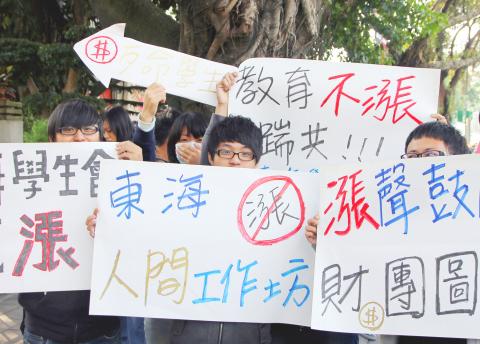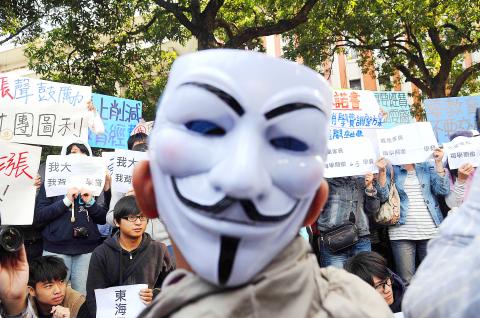More than 100 students, parents, teachers and workers yesterday demonstrated outside the Ministry of Education, protesting against the ministry’s plan to institutionalize college tuition fee adjustments and the cancellation of a public hearing on the issue.
“No to tuition increases,” “Withdraw the proposal or step down,” the protestors shouted.
Minor physical clashes broke out between the police and protestors when Tsai Chung-li (蔡忠利), an official from the ministry’s Department of Higher Education, came out to receive a petition from the protestors, but declined to promise to withdraw the tuition fee adjustment proposal.

Photo: CNA
The protestors attempted to force their way into the ministry building, but were pushed back by the police.
The angry crowd then threw flyers with their appeals across the ministry’s fence, while pasting tuition payment notices on the fence.
“Tuition should not go up, rather, it should go down,” a National Tsinghua University student, Chen Wei-ting (陳為廷) told the crowd. “The government says that it’s facing a budget shortage for education, but we think that budget shortages are happening because the government gives too many tax cuts to big corporatations.”

Photo: CNA
“Businesses should shoulder the responsibility for training future employees, they should not simply enjoy the benefits of cheap labor,” Chen added.
He said that if the government could levy an extra 2 percent tax from the total annual profit of NT$4.8 trillion (US$145 billion) that big businesses make in Taiwan, “there could be an extra NT$100 billion for education.”
Lo Te-shui (羅德水), deputy secretary-general of the National Federation of Teachers Unions, pointed out that as many as 40 percent of families in the country make less than NT$500,000 a year and that tuition fee hikes may be a big burden on these families.
“The objective of education is to enhance the movement between social classes, and to help students in fulfilling their dreams,” Lo said. “The unequal distribution of education resources is really worrisome.”
Several members of the Hualong Union also took part in the demonstration.
Yeh Chi-chin (葉紫金), a member of the union, said he is a father of two private college students.
“The tuition and other expenses, such as housing for my two kids, is a huge financial burden for me,” he said.
“It’s sad to see students become indebted with student loans as soon as they graduate, but then only make NT$20,000 to NT$30,000 a month,” Yeh added.

Taiwan is stepping up plans to create self-sufficient supply chains for combat drones and increase foreign orders from the US to counter China’s numerical superiority, a defense official said on Saturday. Commenting on condition of anonymity, the official said the nation’s armed forces are in agreement with US Admiral Samuel Paparo’s assessment that Taiwan’s military must be prepared to turn the nation’s waters into a “hellscape” for the Chinese People’s Liberation Army (PLA). Paparo, the commander of the US Indo-Pacific Command, reiterated the concept during a Congressional hearing in Washington on Wednesday. He first coined the term in a security conference last

Prosecutors today declined to say who was questioned regarding alleged forgery on petitions to recall Democratic Progressive Party (DPP) legislators, after Chinese-language media earlier reported that members of the Chinese Nationalist Party (KMT) Youth League were brought in for questioning. The Ministry of Justice Investigation Bureau confirmed that two people had been questioned, but did not disclose any further information about the ongoing investigation. KMT Youth League members Lee Hsiao-liang (李孝亮) and Liu Szu-yin (劉思吟) — who are leading the effort to recall DPP caucus chief executive Rosalia Wu (吳思瑤) and Legislator Wu Pei-yi (吳沛憶) — both posted on Facebook saying: “I

The Ministry of Economic Affairs has fined Taobao NT$1.2 million (US$36,912) for advertisements that exceed its approved business scope, requiring the Chinese e-commerce platform to make corrections in the first half of this year or its license may be revoked. Lawmakers have called for stricter enforcement of Chinese e-commerce platforms and measures to prevent China from laundering its goods through Taiwan in response to US President Donald Trump’s heavy tariffs on China. The Legislative Yuan’s Finance Committee met today to discuss policies to prevent China from dumping goods in Taiwan, inviting government agencies to report. Democratic Progressive Party Legislator Kuo Kuo-wen (郭國文) said

The Ministry of Economic Affairs has fined Taobao NT$1.2 million (US$36,900) for advertisements that exceeded its approved business scope and ordered the Chinese e-commerce platform to make corrections in the first half of this year or its license would be revoked. Lawmakers have called for stricter supervision of Chinese e-commerce platforms and more stringent measures to prevent China from laundering its goods through Taiwan as US President Donald Trump’s administration cracks down on origin laundering. The legislature’s Finance Committee yesterday met to discuss policies to prevent China from dumping goods in Taiwan, inviting government agencies to report on the matter. Democratic Progressive Party